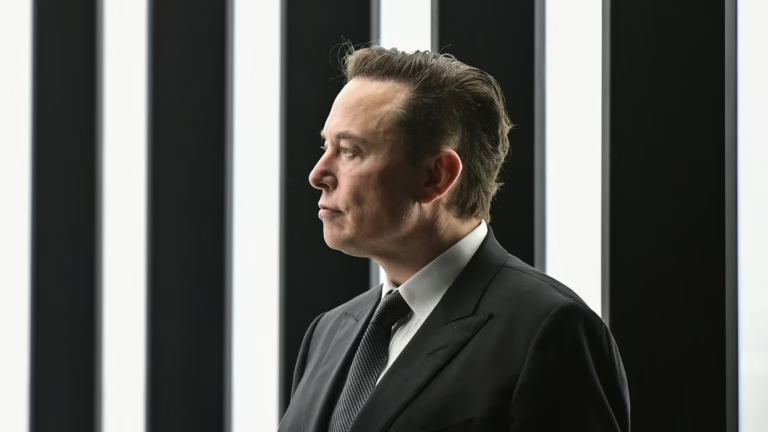Tesla CEO Elon Musk attending the inauguration of Tesla’s Gigafactory on March 22, 2022, in Gruenheide, southeast of Berlin.
PATRICK PLEUL/AFP via Getty Images
hide caption
toggle caption
PATRICK PLEUL/AFP via Getty Images
This Wednesday, the Delaware Supreme Court is set to revisit the ongoing legal battle surrounding Tesla CEO Elon Musk’s unprecedented compensation plan.
Originally proposed in 2018, Musk’s pay package was structured without a traditional salary. Instead, it granted him escalating amounts of Tesla stock contingent on the company’s performance. The most ambitious targets required Tesla’s market value to increase tenfold-a goal many considered wildly optimistic at the time. The board had informed shareholders that Musk could potentially earn $55.8 billion if all milestones were achieved.
Since then, Tesla’s rapid expansion enabled Musk to unlock the entire stock award by 2022, according to the company. The valuation of this package fluctuates with Tesla’s share price, which is known for its volatility. As of mid-October 2025, with shares trading at $429.24, the package’s worth could exceed $100 billion. Even a fraction of this sum would represent the largest payout ever granted to a CEO of a publicly traded firm.
However, Musk’s receipt of this compensation remains uncertain as the lawsuit challenging the package continues.
What grounds does the lawsuit rest upon?
In 2018, Tesla shareholder Richard Tornetta initiated legal action against Musk, Tesla, and its board, alleging breaches of fiduciary duty. Tornetta contended that Musk wielded excessive influence over the board, which compromised their ability to objectively determine his pay. Although Musk’s brother, a board member, recused himself from the compensation decision, other directors with close personal ties to Musk remained involved.
The suit also claimed shareholders were not fully informed during the vote to approve the package, particularly regarding the board members’ relationships with Musk and his sway over the compensation proposal.
Filed in Delaware’s Court of Chancery-the jurisdiction handling corporate disputes-this case reflects Tesla’s incorporation in Delaware, a common choice for major U.S. companies.
Tesla’s defense has emphasized that shareholders approved the package with full knowledge of its terms and that the pay was performance-based. They argue that Musk’s extraordinary compensation was justified by Tesla’s exceptional stock growth under his leadership.
“Defying expectations, Musk increased Tesla’s value by approximately 1400%, with shareholders retaining over 90% of that growth,” Tesla’s attorneys stated in court filings. They maintain that the compensation plan was designed to reward such remarkable achievements.
Several Tesla shareholders have submitted statements supporting the company’s position, affirming they were adequately informed when voting.
How did the lower court rule?
Delaware’s Chancery Court sided with Tornetta, deeming the compensation package an “unfathomable sum” and excessive. Judge Kathaleen McCormick ordered Tesla to devise a new pay plan.
In response, Tesla resubmitted the identical package for shareholder approval in 2024, which passed again. However, McCormick dismissed this second vote, ruling that simply re-approving the same plan did not satisfy the requirement to create a new compensation structure.
Musk and Tesla’s board appealed this decision to the Delaware Supreme Court earlier this year.
What are the central issues the Supreme Court will consider?
The justices will determine whether the pay package was an extraordinary case of undue influence and insufficient shareholder disclosure, or a legitimate business decision deserving judicial deference. Generally, courts respect decisions made by corporate boards and shareholders unless clear misconduct is evident.
If the court finds the package warrants heightened scrutiny, it may assess whether the compensation was disproportionate compared to typical CEO pay or justified by the ambitious performance targets.
The court will also evaluate whether the 2024 shareholder vote rectifies any procedural flaws from 2018.
What is Elon Musk’s current compensation status?
Regardless of the 2018 package’s fate, Musk’s substantial Tesla shareholding has allowed him to benefit immensely from the company’s soaring stock price. He owns roughly 13% of Tesla and recently acquired an additional $1 billion in shares.
This summer, Tesla’s board approved an “interim” compensation package granting Musk $29 billion in stock options. This package is explicitly intended as an alternative to the contested 2018 plan-Musk will receive either the original package if reinstated or this interim award, but not both.
Additionally, Tesla’s board has proposed a new compensation plan that, if fully realized, could elevate Musk to the status of the world’s first trillionaire. To contextualize, earning one dollar per second would make you a millionaire in under 12 days, a billionaire in about 32 years, and a trillionaire in 32,000 years.
Similar to the 2018 plan, this new proposal consists solely of stock options tied to ambitious goals, including the number of subscribers to Tesla’s “Full Self-Driving (Supervised)” software, the deployment of robotaxis, and overall financial performance. Reuters’ recent analysis suggests Musk could earn billions even without achieving some of the most headline-grabbing targets, such as delivering fully autonomous vehicles.
Shareholders are scheduled to vote on this new compensation plan at the annual meeting on November 6.
What impact has this lawsuit had?
Delaware’s reputation for business-friendly corporate law has attracted over two-thirds of Fortune 500 companies to incorporate there.
Following the initial ruling invalidating Musk’s pay package, he publicly discussed relocating Tesla’s incorporation to Texas. After a shareholder vote in June 2024, Tesla officially shifted its legal domicile from Delaware to Texas, having previously moved its headquarters from California.
This trend of companies moving their legal base away from Delaware has earned the nickname “Dexit.”
“A series of rulings in Delaware’s Chancery Court has begun to erode corporate confidence in Delaware as a jurisdiction,” noted Beth I.Z. Boland, a partner at Foley and Lardner, during a recent webinar. While the Tornetta case was not the only contentious decision, it became a prominent example causing concern among corporate leaders.
In response to the “Dexit” phenomenon, Delaware’s legislature enacted new laws earlier this year aimed at preserving its pro-business image, including measures to make shareholder lawsuits like Tornetta’s more difficult to pursue.
As reported by Spotlight Delaware, the Delaware Supreme Court is set to hear a challenge to the constitutionality of this legislation on November 5, shortly after hearing arguments in the Musk compensation case that partly motivated the new law.





















